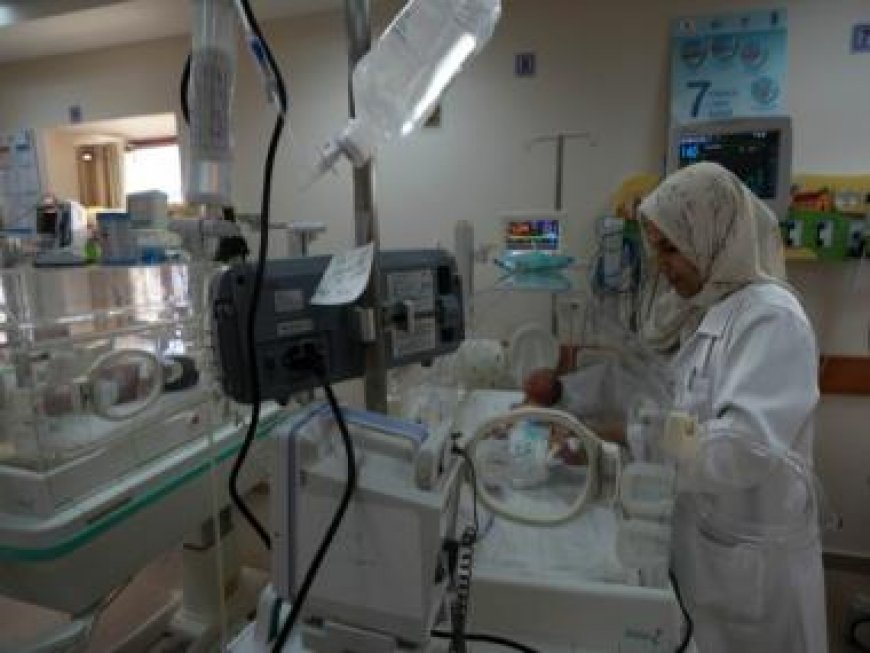Packed hospitals, treacherous roads, harried parents: Newborns in Gaza face steeper odds of survival
Packed hospitals, treacherous roads, harried parents: Newborns in Gaza face steeper odds of survival

The birth of their baby should have signalled the start of a new chapter in the lives of the young Palestinian couple.
Instead, the horrific conflict in Gaza, now in its third month, has made delivery and motherhood difficult for Salim and Israa al-Jamala.
First, they braved a risky trek to a maternity ward, evading missile fire. And now, the couple is taking refuge with their infant in a partially tented courtyard of another hospital, where they can’t adequately care for their now 3-week-old daughter, named after her mother.
Salim, 29, was cradling infant Israa, swaddled in blankets in a cot cobbled together from wood pieces, and said that his wife’s breast milk is insufficient since she cannot eat enough due to severe food shortages. Baby formula and treatment for the infant’s recurrent cough are either unavailable or prohibitively expensive.
The war, sparked by a lethal Hamas attack on southern Israel on October 7, has wreaked unparalleled devastation, with more than 18,000 Palestinians killed and almost 50,000 injured in Israel’s invasion, according to health authorities in Hamas-run Gaza. The original Hamas attack in Israel killed over 1,200 individuals, the majority of whom were civilians.
Despite the damage, some 5,500 births are expected during the next month, out of an estimated 50,000 pregnant women in Gaza, according to the World Health Organisation.
However, the health system is on the verge of collapse, with two-thirds of Gaza’s 36 facilities currently closed. The remaining 12 health care institutions are only partially functional. Even in operating hospitals, doctors describe a dearth of essential drugs and equipment required to treat babies, such as ventilators, formula milk, and disinfectants.
Another big problem for hospitals that have been running primarily on generators since the beginning of the conflict, when Israel cut Gaza’s energy supply.
“Electricity sometimes comes on for a few minutes” before dropping off, said Wisam Shaltout, head of the neonatal intensive care unit at the Al-Aqsa Hospital in Deir al-Balah in central Gaza.
Salim and Israa’s odyssey began in mid-October. During that period, the Israeli military had been issuing daily warnings to residents of northern Gaza, including Gaza City, to head to the southern half of the territory ahead of a looming Israel ground offensive in the north.
Heeding the warnings, Salim, a heavily pregnant Israa and their 5-year-old son fled their home in the Sheikh Radwan neighborhood of Gaza City and headed south on foot. The family of three shortly arrived at Shifa hospital in Gaza City before managing to secure a taxi later that day to take them to Al-Aqsa Hospital where they found shelter.
When 26-year old Israa went into labor on Nov. 23, the pair were told to head to Al-Awda Hospital, near the Nuseirat refugee camp, as it still had a maternity ward.
The couple managed to find a Red Crescent ambulance to take them to Al-Awda, just 6 kilometers (3.7 miles) away. But it was a frightful stop-start journey that took more than an hour because three airstrikes hit near the road.
Most arriving at Al-Awda’s maternity ward have no vehicle to help. Some pregnant women are too scared to go at all, fearing airstrikes that in some cases have also struck ambulances, said Dr. Yasmin Kafarneh, who runs the obstetrics department at Al-Awda.
She said she believes her department is the only functioning maternity ward in southern Gaza. Before the war, the department used to handle around six births a day. Now, pregnant women arrive from all over and more than 70 babies are delivered each day.
Under the current conditions, first-time mothers are permitted to stay and receive treatment in the hospital for around four hours after giving birth, while those who have previously given birth can stay for only half that time.
Israa gave birth at 2 a.m. on Nov. 24, but the joy was short-lived. Just after daybreak, the family was told by medical staff they had to leave to make room for others.
They secured a donkey cart to carry them back to their shelter at the Al-Aqsa Hospital. They have little to eat, some days just onions.
Their neighbors make fires to stay warm, sometimes burning plastic that releases toxic fumes. “The atmosphere here is all smoke, all dust,” Salim said. “It is not an appropriate environment for a newborn girl!”
The baby’s health has deteriorated, said Salim, troubled by her persistent cough.
Israa was born just hours before a cease-fire took effect that lasted a week. After fighting resumed and ground forces advanced in central and southern Gaza, their shelter became even more crowded.
Given the circumstances, Salim said he has done the best he can. But he’s scared for his daughter. “I do not know whether she will be alive tomorrow,” he said.
What's Your Reaction?



























































